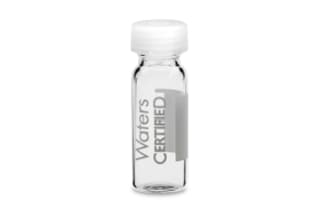
|
Certified |
LCGC Certified |
|
Closure Type |
Screw Neck |
|
Cap Color |
White |
|
Dimensions |
12 x 32 mm |
|
Format |
Regular |
|
Material |
Clear Glass |
|
Seal Material |
Polyethylene Septumless |
|
Volume Capacity |
2 mL |
|
Type |
Autosampler vial |
|
Includes |
Vial, Cap, & Septum |
|
UNSPSC |
41121806 |
|
Application |
Sample Preparation |
|
Product Type |
Vials |
|
Units per Package |
100 pk |
LCGC Certified Clear Glass 12 x 32 mm Screw Neck Vial, with Polyethylene Septumless Cap, 2 mL Volume, 100/pk
The choice of vials used in analysis should always be informed and consistent with your chosen application and lab equipment. All lines of Waters vials are certified within dimensional tolerances for height, width, neck opening, neck center, threads, and bottom thickness as specified for autosamplers. LCGC Certified Clear Glass Vials are UV-tested by HPLC. These HPLC tests are designed to detect trace levels of chemicals that are used in the manufacturing and packaging process. Chemicals may include lubricants, surfactants, antistatic agents, and antioxidants from packaging. In order to ensure cleanliness, each batch of vials is tested several days after packaging.
This vial features a universal screw neck. Screwing the cap applies a mechanical force that squeezes the septum between the glass rim and the cap. This style of cap forms an excellent seal, with no additional tools required for assembly. The septumless cap is recommended for single injection applications because it does not reseal upon puncturing, and is ideal for use in MS applications. These caps offer excellent solvent resistance and chemical compatibility. Polyethylene Septumless Screw Cap for 12 x 32 mm Vials, 100/pk can be bought separately as well.
Each order contains 100 vials with polyethylene caps with a volume of 2 mL each. LCGC Certified Clear Glass Vials are made using type 1, 33-expansion glass, the most chemically inert glass obtainable, allowing for high-quality test results. This glass is composed primarily of silicone and oxygen, with trace amounts of boron and sodium, leading to an expansion coefficient of approximately 33 x 10 ^ -7 C.
When Should I Use Glass Vials Versus Plastic Vials?
Glass vials are the most common choice for most labs because of the fact that they are pure, meaning the glass components do not contain any traces of contaminants, such as metal, that could interfere with an experiment. Additionally, glass is heat resistant, which is crucial as many vials will need to be heated above 500 degrees Celsius. Plastic vials can provide benefits such as good chemical resistance, lightweight construction, durability, and affordability that may make them a better choice than glass in appropriate cases. Common plastics have heat resistance up to 135-170 degrees Celsius.